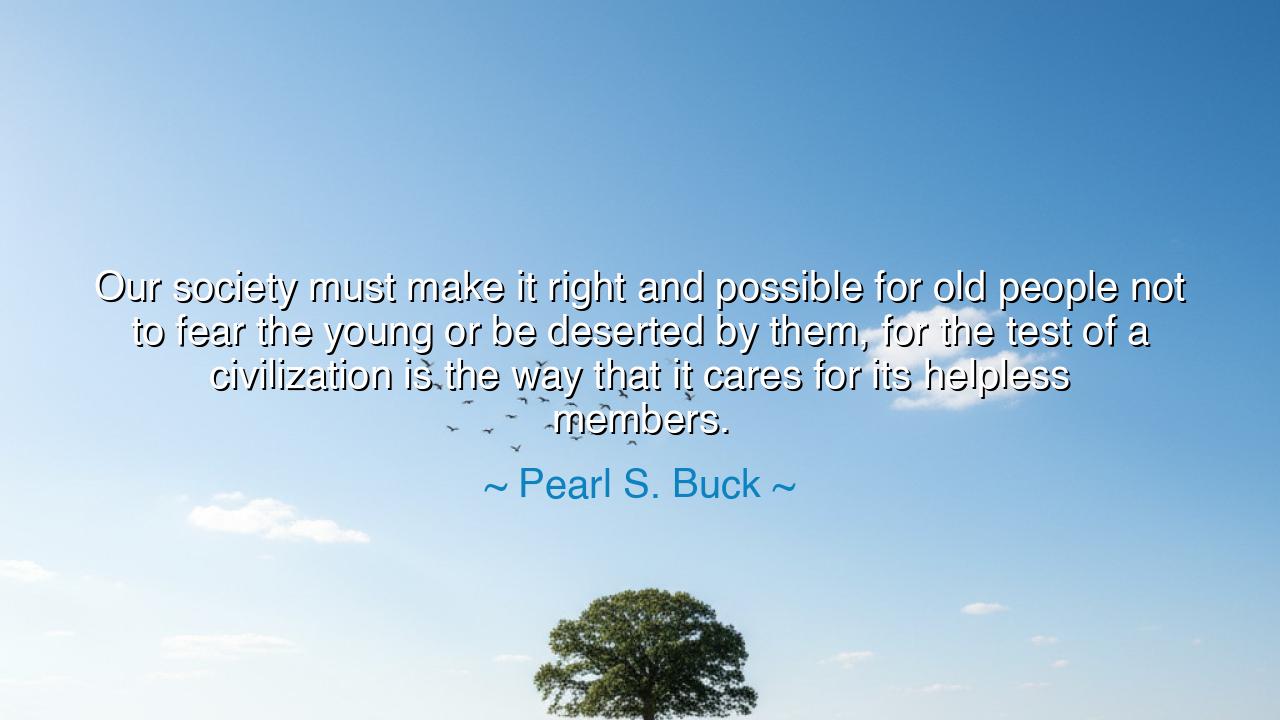
Our society must make it right and possible for old people not to
Our society must make it right and possible for old people not to fear the young or be deserted by them, for the test of a civilization is the way that it cares for its helpless members.






Hear, O listener, the tender and yet commanding words of Pearl S. Buck: “Our society must make it right and possible for old people not to fear the young or be deserted by them, for the test of a civilization is the way that it cares for its helpless members. These words are not only counsel but judgment. They measure the worth of nations not by armies, nor by wealth, nor by monuments, but by the gentleness with which they hold their most fragile souls—the aged, the weak, the ones who cannot fend for themselves.
For what is the purpose of civilization, if not to soften the cruelty of life? The beasts of the wild abandon their wounded; storms and seasons care nothing for the old or frail. But man, in forming society, lifted himself above the law of tooth and claw. He vowed, whether spoken or unspoken, to build a place where no one is cast aside, where age is honored, and where the helpless are sheltered. If this vow is broken, then all other achievements—science, art, conquest—become hollow, for they rest on foundations of neglect.
Consider the story of ancient Rome. In its glory, it raised aqueducts and roads, its legions marched across the known world. Yet as its heart decayed, the poor and the old were left to suffer in the shadows. Bread and circuses were offered to keep the masses quiet, but compassion failed. Rome collapsed not only under the weight of barbarians but also under its own refusal to care for its weakest. Pearl Buck’s words remind us: no empire, however mighty, endures if it abandons its duty to the helpless.
But look also to examples of light. In many traditional villages of China and Africa, the elderly were honored as the living memory of the people. They were not discarded but revered. The young sought their counsel, the community fed them, and their presence gave meaning to the continuity of life. This is what Buck, who herself grew up among the people of China, saw and carried into her wisdom: that harmony between generations strengthens the soul of a nation.
In our modern age, however, too often the old are cast into loneliness. In cities crowded with millions, they may die unseen in small rooms, forgotten by their children, neglected by the state. The young rush forward in pursuit of speed and progress, leaving behind those whose steps are slower. Here the prophecy of Buck is urgent: a society that deserts its elders has betrayed its own future, for the young too shall one day be old, and the measure they gave shall be the measure they receive.
The lesson is clear and weighty: the test of civilization is not in its towers or its machines, but in whether the frail find comfort and whether the helpless find care. To the strong, this teaching commands: do not despise weakness, for in your strength lies responsibility. To the young, it calls: honor those who walked before you, for without their labor you would not stand where you are. To the whole of society, it cries: weave your progress with compassion, lest your civilization crumble into vanity.
Therefore, O child of tomorrow, make this wisdom a law in your life. Visit the aged, care for the helpless, and defend the dignity of those who cannot defend themselves. Build systems of justice and compassion that endure beyond your years. For in these acts, you do more than honor individuals—you uphold the very essence of civilization. Let no one be deserted, let no generation fear another, and let compassion be the true monument of your people. Only then will it be said that your world was truly great.






AAdministratorAdministrator
Welcome, honored guests. Please leave a comment, we will respond soon